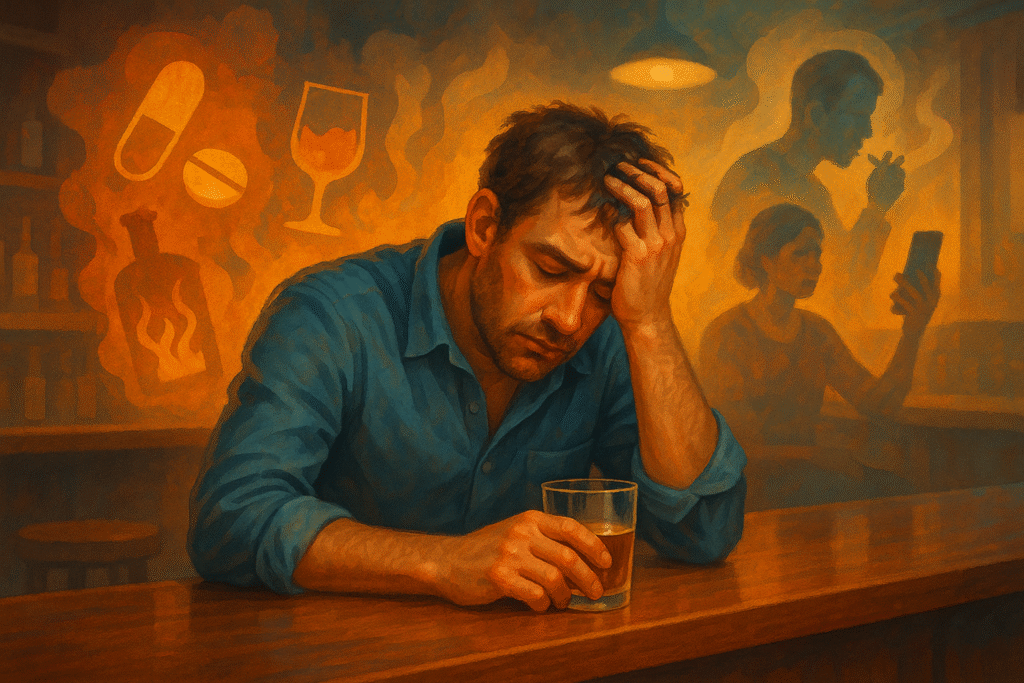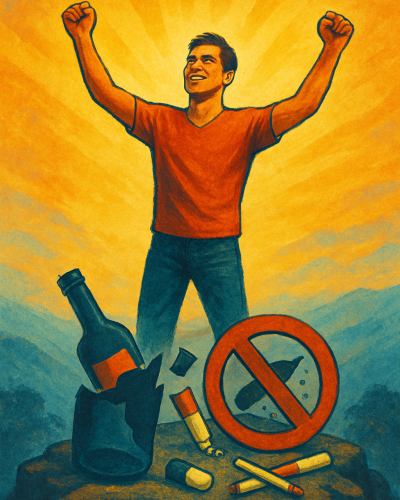
Hypnosis for Addiction
What Is Addiction?
A 2014 report from the National Survey on Drug Use and Health (NSDUH) found that over 21.5 million Americans (ages 12 & up) had struggled with some form of addiction. In nearly all cases, people felt compelled to engage in behaviors or use substances even when it negatively affected their lives.
Addiction can be behavioral (e.g., gambling, sex, internet use) or substance-based (e.g., drugs, alcohol, nicotine, food). In most cases, these habits start off as coping strategies — sometimes even useful ones. But over time, the behavior becomes compulsive, disruptive, and emotionally charged.
As addiction progresses, the person often loses the ability to moderate their behavior. Others begin to notice: family members, friends, coworkers. And eventually, the consequences start to outweigh the comfort the habit once provided.
Does this sound familiar? If so, it may be time to seek help.
What Causes Addiction?
While the root causes of addiction vary from person to person, science has identified several risk factors. These include both behavioral and biological influences.
Hypnosis can help rewire these deeply conditioned responses by engaging the subconscious mind, where behavioral patterns are stored and reinforced.
Behavioral Factors
-
Genetics – A family history of addiction increases your risk. Specific genes may also influence how quickly or severely addiction develops.
-
Childhood Trauma – Experiences like abuse, neglect, or loss in childhood can lead to emotional wounds that manifest as addiction later in life.
-
Mental Health – Individuals who struggle with anxiety or depression often turn to addictive behaviors as a form of escape or self-medication.
-
Stress Management – Poor coping skills and chronic stress increase susceptibility to compulsive behavior patterns.


Chemical & Neurological Factors
-
Early Substance Use – Engaging with drugs or alcohol at a young age can rewire the brain and increase the likelihood of dependency.
-
Neurochemistry – Addictive behaviors trigger the brain’s reward system by releasing dopamine and other “feel good” chemicals. Over time, the brain craves more of the substance or activity to feel pleasure.
-
Tolerance & Withdrawal – As the brain adapts, it takes more of the substance or activity to achieve the same “high.” Withdrawal symptoms (irritability, nausea, anxiety) can reinforce the cycle.
Signs You May Be Dealing with Addiction
If you’re unsure whether a habit has crossed the line into addiction, consider these common red flags:
-
The behavior interferes with work, relationships, or daily functioning.
-
You’ve lost interest in hobbies or activities you once enjoyed.
-
You experience withdrawal symptoms — like anxiety, irritability, or nausea — when you try to stop.
-
Despite the negative impact, you continue the habit.
-
You feel compelled to do it more frequently to feel the same effect.
-
You feel powerless to stop, even when you want to.
If any of this sounds familiar, know that you’re not alone — and that help is available.
How Hypnosis Helps with Addiction
Hypnosis works by creating a state of deep relaxation and focused attention. In this state, your subconscious mind becomes more open to new perspectives, healthier habits, and emotional release.
During your sessions at Hoosier Hypnosis, your hypnotist will help you:
-
Identify and address the emotional triggers behind your addiction
-
Strengthen your motivation and willpower
-
Reshape your internal dialogue and self-image
-
Build healthier coping mechanisms and routines
Hypnotherapy can be particularly helpful when traditional approaches haven’t worked, or when a person is ready to make a change but feels stuck.
Learn how hypnosis works or explore our other services for treating emotional and behavioral issues.
Don’t Wait — Take the First Step Today
The longer addiction continues, the harder it becomes to stop. But with support and the right strategies, recovery is possible. Whether you’re struggling yourself or concerned about a loved one, don’t wait.
If you’re looking for a non-judgmental, effective approach, hypnosis may be the solution you’ve been seeking.
If you find yourself struggling with Addiction, seek help as soon as possible. If you would like to know more about our process, please see About Hypnosis or feel free to Contact Us.
References
-
Substance Abuse and Mental Health Services Administration. (2015). 2014 National Survey on Drug Use and Health: Detailed Tables.
-
American Psychological Association. (n.d.). Hypnosis
Call now for a free consultation with a hypnotist.
317-699-1066
Why Hypnosis Helps
Relaxation
Hypnosis can help to induce a state of deep relaxation, which can reduce muscle tension and lower overall stress levels.
Cognitive restructuring
Hypnosis can help to change negative thought patterns and beliefs that may be contributing to anxiety and stress. This can help to improve a person's overall outlook and reduce feelings of anxiety and stress.
Behavioral change
Hypnosis can help to change behaviors that may be contributing to anxiety and stress. For example, a person may be taught self-hypnosis to use when they feel anxious or stressed, which can help to reduce those feelings.
Improved coping mechanisms
Hypnosis can help a person to develop new strategies for coping with stressors, so they can handle difficult situations more effectively, which can reduce overall stress and anxiety levels.
Client Testimonials



